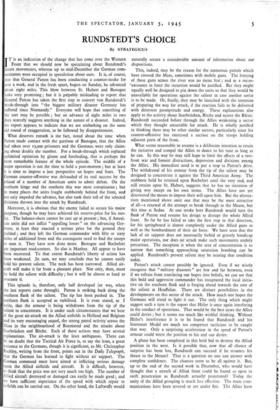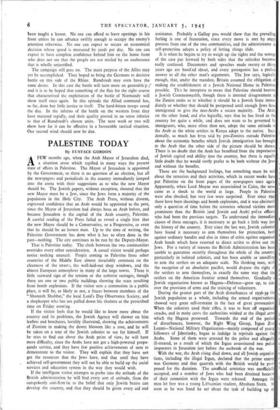RUNDSTEDT'S CHOICE
By STRATEGICUS
What deserves remark is the fact, noted about the time when Patton made contact with the garrison of Bastogne, that the Allies had taken over 13,000 prisoners and the Germans were only claim- ing about double the number. For a break-through which replaced unlimited optimism by gloom and foreboding, that is perhaps the most remarkable feature of the whole episode. The middle of a major operation is not the time to hold a post-mortem ; but at least it is time to impose a just perspective on hopes and fears. The German counter-offensive was defrauded of its real success by the refusal of a number of American units to admit defeat. On the northern hinge and the southern this was most conspicuous ; but n many places the units fought stubbornly behind the front, and of only impeded the advance, but also took their toll of the selected divisions thrown into the attack by Rundstedt.
Moreover, it is obvious that the enemy failed to secure his major purpose, though he may have achieved his reserve-price for his out- ay. The balance-sheet cannot be cast up at present ; but, if Ameri- can units did not inflict " appalling losses " on the advancing Ger- mans, at least they exacted a serious price for the ground they yielded ; and they left the German commander with fifty or sixty
iles of additional front and the consequent need to find the troops to man it. They have now done more. Bastogne and Rochefort arc important road-centres. So also is Manhay. All appear to have been recovered. To that extent Rundstedt's liberty of action has been weakened. In sum, we may conclude that he cannot easily hold his present salient. The neck has been narrowed. Allied air- craft will make it far from a pleasant place. Not only, then, must he hold the salient with difficulty ; but it will be almost as hard to evacuate it.
This episode is, therefore, only half developed (or was, when the last reports came through). Patton is striking back along the southern flank of the salient. The tip has been pushed in. The northern flank is accepted as stabilised. It is even stated, as I write, that the armour is being withdrawn from the tip of the salient to concentrate. It is under such circumstances that we hear of the great air-attack on the Allied airfields in Holland and Belgium and its very encouraging sequel, the strong patrol activity across the Maas in the neighbourhood of Roermond and the attacks about Saarbrucken and Bitche. Each of these actions may have several explanations. The air-attack is the least ambiguous. There can be no doubt that the Tactical Air Force is, to say the least, a great nuisance to the Germans, though it is significant, as Mr. Christopher Buckley, writing from the front, points out in the Daily Telegraph, that the German has learned to fight without air support. The German command must have aimed at inflicting serious damage upon the Allied airfields and aircraft. It is difficult, however, to think that the price was not very much too high. The number of
Hied aircraft destroyed or damaged can easily be made good ; and we have sufficient experience of the speed with which repair to airfields can be carried out. On the other hand, the Luftwaffe would naturally secure a considerable amount of information about our dispositions.
This, indeed, may be the reason for the numerous patrols which have crossed the Maas, sometimes with mobile guns. The ferrying of these guns across the river was no mean feat ; and as a recon- naissance in force the incursion would be justified. But they might equally well be designed to pin down the units so that they would be unavailable for operations against the salient in case another sortie is to be made. Or, finally, they may be launched with the intention of preparing the way for attack, if the reaction fails to be delivered with deterrent promptitude and energy. These explanations also apply to the activity about Saarbriicken, Bitche and nearer the Rhine. Rundstedt succeeded before through the Allies weakening a sector which they thought unsuitable for attack. He is wholly justified in thinking there may be other similar sectors, particularly since his counter-offensive has exercised a suction on the troops holding adjacent parts of the front.
What seems reasonable to assume is a deliberate intention to retain the initiative and compel the Allies to dance to his tune as long as he can. In this way he may still hope to limit the effects of a two- front war and foment distractions, depression and divisions among the Allies. His immediate need is to put a stop to Patton's drive. The withdrawal of his armour from the tip of the salient may be designed to concentrate it against the Third American Army. The stubborn hold he retained upon Rochefort until the very end, and still retains upon St. Hubert, suggests that he has no intention of giving way except on his own terms. The Allies have not yet discovered the means to impose their will upon him. But the alterna- tives mentioned above omit one that may be the most attractive of all—a renewal of the attempt to break through to the Meuse, but this time at Sedan. At one stroke here Rundstedt would turn the flank of Patton and resume his design to disrupt the whole Allied front. So far he has failed to take the first step in that direction, for his springboard is almost completely under the Allied guns as well as the bombardment of their air force. We have seen that the lack of air support does not necessarily forbid or gravely handicap major operations, nor does air attack make such movements unduly precarious. The exception is when the area of concentration is so narrow that something approaching saturation bombing can be applied. Rundstedt's present salient may be nearing that condition today.
Patton's attack cannot possibly be ignored. Even if we wisely recognise that "military disasters " are few and far between, even if we refrain from translating our hopes into beliefs, we can see that this bold and aggressive commander has recaptured the local initia- tive on the southern flank and is forging ahead towards the robt of the salient at Houffalize. There are distinct possibilities in the developments on this sector of the attack. How much one hopes the Germans will stand to fight it out. The only thing which might suggest such a turn is the report that Hitler is once again interfering in the conduct of operations. That would be the best news the Allies could desire ; but it seems too much like wishful thinking. Without Hitler's interference it is to be feared that Rundstedt and his lieutenant Model are much too competent tacticians to be caught that way. Only a surprising acceleration in the speed of Patton's armour could wrest the position to his and our desire.
A phase has been completed in this bold bid to destroy the Allied position in the west. Is it possible that, now that all chance of surprise has been lost, Rundstedt can succeed if he resumes his thrust to the Meuse? That is a question no one can answer with complete confidence. The chances seem to be all against it. But, up to the end of the second week in December, who would have thought that a stretch of Allied front could be found so open to swift penetration as Rundstedt actually penetrated? Today the unity of the Allied grouping is much less effective. The main com- munications have been severed or are under fire. The Allies have been taught a lesson. No one can afford to leave openings in his front unless he can advance swiftly enough to occupy the enemy's attention otherwise. No one can expect to secure an economical decision whose speed is measured by yards per day. No one can expect to have complete confidence behind him on the home front who does not see that the people are not misled by an exuberance that is wholly unjustified.
The campaign still goes on. The main purpose of the Allies may yet be accomplished. They hoped to bring the Germans to decisive battle on this side of the Rhine. Rundstedt may even have the Same desire. In this case the battle will turn more on generalship ;' and it is to be hoped that something of the flail for the right course that characterised the exploitation of the battle of Normandy will show itself once again. In this episode the Allied command has, so far, done but little justice to itself. The hard-bitten troops saved the day. In the inferno of the battle on the western front they have matured rapidly, and their quality proved in no sense inferior to that of Rundstedt's chosen units. The next week or two will show how far it can be effective in a favourable tactical situation. Our second wind should now be due.



























 Previous page
Previous page